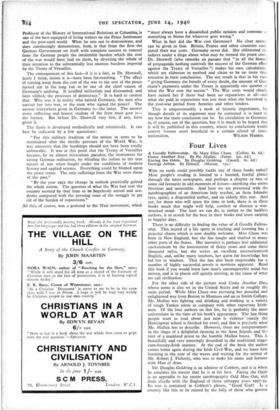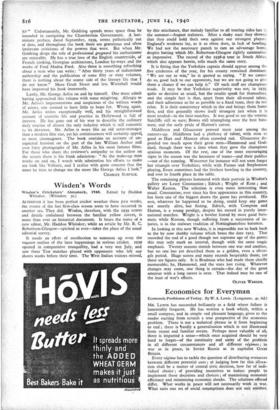Four Lives
Wito on earth could possibly tackle any of these books today? Most people's reading is limited to a hurried, fearful glance through the latest newspaper, and perhaps a chapter or two of some old favourite in odd moments of leisure—anything else seems frivolous and unsuitable. And here we are presented with the autobiographies of an American lady teacher, an Aran Islander (yes, again), a disgruntled author, and an elderly film star. And yet, for those who will spare the time to look, there is in these books much that might well help, comfort or distract a war- wracked mind. The least we can do, in justice to the luckless authors, is to search for the best in their books and leave carping to happier days.
There is no difficulty in finding the value of A Goodly Fellow- ship. This record of a life spent in teaching and learning has a peaceful charm which is now doubly welcome. Miss Chase was born in New England, but she has taught and studied in many other parts of the States. Her narrative is perhaps lent additional enchantment by the intervention of thirty years and some three thousand miles, but she writes an excellent unamericanised English, and, unlike many teachers, her quest for knowledge has led her to wisdom. That she has also been responsible for a number of highly successful novels is nowhere apparent. Read this book if you would learn how man's unconquerable mind has striven, and is in places still quietly striving, in the cause of what we call civilisation.
For the other side of the picture read Come Another Day, whose scene is also set in the United States and in roughly the same period. While Miss Chase was pursuing her peaceful and enlightened way from Boston to Montana and on to Smith College, Mr. Mullen was fighting and drinking and working in a variety of tough Yankee joints in company with other expatriate Irish- men. Of the four authors on this list, he is probably the most unfortunate in the time of his book's appearance. The last thing people want to read about just now is violence (surely the Hemingway school is finished for ever), and that is precisely what Mr. Mullen has to describe. However, there are compensations in the shape of a delightful opening in the Aran Islands and the visit of a mainland priest to the humble Mullen house. This is beautifully and very amusingly described in the traditional stage- cum-literary-Irish manner. At the end of the book the author comes home again during the Irish Civil War, and we leave him listening to the roar of the waves and waiting for the arrival of Mr. Robert J. Flaherty, who was to make his name and fortune with Man of Aran.
Mr. Douglas Goldring is an admirer of Cobbett, and it is when
he emulates his master that he is at his best. Facing the Odds is an appendix to his recent autobiography Odd Man Out, and deals chiefly with the England of those unhappy years 1937-39. Its text is contained in Cobbett's phrase, " Good God! Is a
country like this to be ruined by the folly of those who govern
it? " Unfortunately, Mr. Goldring spends more space than he intended in castigating the Chamberlain Government. A last- minute preface, dated September, 1939, seems pathetically out of date, and throughout the book there are gratuitous and often irrelevant criticisms of the powers that were. But when Mr. Goldring drops the role of professional grognard his enthusiasms are enjoyable. He has a true love of the English countryside, of French cooking, Georgian architecture, London by-ways and the works of Ford Madox Ford. Also there is something refreshing about a man who can write: " After thirty years of industrious authorship and the publication of some fifty or sixty volumes, there is nothing about the seamy side of the literary life that I do not know." More Grub Street and less Whitehall would have improved his book immensely.
Lastly, Mr. George Arliss on and by himself. One must admit having approached this volume with some misgiving. Allergic to Mr. Arliss's impersonations and suspicious of the written words of actors, one seemed to have little to hope for. Wrong again. Mr. Arliss writes exceptionally well, and his straightforward account of scenario life and practice in Hollywood is full of interest. He has gone out of his way to describe the ordinary daily routine of almost the only industry which is still romantic to its devotees. Mr. Arliss is more like an old actor-manager than a modern film star, yet his reminiscences will certainly appeal to most cinemagoers. The book contains an account of un- expected heroism on the part of the late William Archer and over forty photographs of Mr. Arliss in his most famous films. For those who share thc reviewer's antipathy to the author on the screen there is his frank admission: " As the make-up man works on and on, I watch with admiration his efforts to make me look like Voltaire, and I realise with great concern that the more he tries to change me the more like George Arliss I look."
CHARLES SURFACE.































 Previous page
Previous page